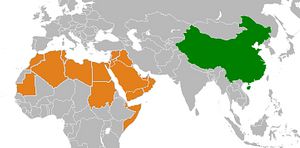On June 5, the sixth Ministerial Meeting of the China-Arab Cooperation Forum (CACF) will open in Beijing. This year’s meeting will also celebrate the 10th anniversary of the CACF, which was created in 2004 during then-President Hu Jintao’s visit to the Arab League headquarters in Cairo, Egypt. The CACF provides a formal dialogue mechanism between China and the Arab League, which includes 21 member states from the Middle East and North Africa. Foreign ministers from 19 of these countries plan to be in Beijing for this week’s forum, according to CCTV.
China’s turn toward the Middle East in some ways is the mirror image of the U.S. pivot to Asia. The U.S. pivot comes as Washington turns away from a decades-long fixation on the Middle East and its surrounding regions. China, meanwhile, has a vested interest in the area for the same reason the U.S. does: oil. China is already the largest importer of Persian Gulf oil, and will soon be the largest importer from OPEC as a whole (if it hasn’t already passed the U.S. in that category). China’s vital energy interests in the region have given it reasons to take a larger interest in regional security, especially as the U.S. turns its focus elsewhere.
As a result, China is trying to broaden its relationship with the Middle Eastern countries. Although energy cooperation remains a major priority for Beijing, deputy foreign minister Zhang Ming told the press that China would also seek “more pragmatic cooperation” with the Arab states in “trade, infrastructure building and high tech.”
If that sounds familiar, it should — China has made similar pronouncements towards a number of countries that it hopes will cooperate in the New Silk Road and Maritime Silk Road projects. Both these versions of the Silk Road would have key stops in the Middle East. The overland route would pass through Iraq and Syria, while the Maritime Silk Road would travel via the Gulf of Aden and the Red Sea. China’s vision for these economic belts involves increased trade, achieved in part through major Chinese investments in building up infrastructure (including ports, roads, and high-speed railway networks).
In addition to building up its economic ties, China is also increasingly highlighting political areas of cooperation. An article in China Daily by Foreign Minister Wang Yi emphasized that China supports “Palestine’s right to an independent Palestinian state.” The Israel-Palestine issue gives China an easy means of distinguishing itself from the U.S. in a way that appeals to the Arab League members. As my colleague Ankit noted, China quickly issued its support for the new unified Palestinian government, despite Israel’s condemnation of the political merger.
Just as China offers support for Arab League interests, Wang Yi noted, “Arab states gave invaluable support to China on issues concerning China’s major interests and core concerns.” China will look to extend this cooperation. Wang wrote that China and the Arab states should “step up coordination and collaboration in regional and international affairs, [and] turn the balance of power in favor of developing countries.”
Still, when it comes to political issues, there are areas where China is at odds with the Arab League — namely, the question of Syria. The Arab League stripped Syria of its membership “due to recent uprising in Syria and their government’s brutal way of dealing with political opponents,” according to the organization’s website. Yet China has been reluctant to support the Arab League’s condemnations of Syria’s government. In 2012, China joined Russia in vetoing a UN Security Council resolution that would have endorsed an Arab League plan to have Bashar al-Assad step aside. In other decisions, however, China has been more receptive to Arab League proposals. In 2011, China allowed the UN to create a “no-fly” zone over Libya largely because the Arab League supported the measure.

































